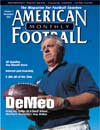AMERICAN FOOTBALL MONTHLY THE #1 RESOURCE FOR FOOTBALL COACHES
Article CategoriesAFM Magazine
|
Moving On...Can a coach ever leave without causing hard feelings?by: Steve Silverman © More from this issue You are coaching at good, old State U. There have been a few bumps and bruises over the years, but that's in the past. You have just led State to a second consecutive 8-3 record and a second straight bowl game. Times are good. The shoe company has just offered you a new deal. Your TV show - the one where you review yesterday's game with the local yahoo sportscaster - is a success as ratings are up 20 percent. One of the local alums has offered you a part-ownership in the new restaurant that's going up and the local newspaper columnists are even praising "your ability to motivate young men" and the creative gameplan you've put together. All of the outside factors are positive and your family is comfortable and happy. Not only that, State U. is making serious noises about a new contract. Not just an extension either. Serious m....The full article can only be seen by subscribers.
|
|
|||||||
| HOME |
MAGAZINE |
SUBSCRIBE | ONLINE COLUMNISTS | COACHING VIDEOS |
Copyright 2026, AmericanFootballMonthly.com
All Rights Reserved





